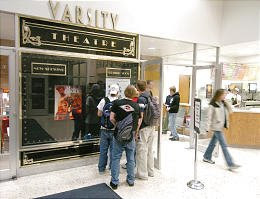 BY MARY LYNN BAHR / Aug 1, 1998
BY MARY LYNN BAHR / Aug 1, 1998BYU Magazine
When the Wilkinson Center opened in 1964, some of the first films shown in the Varsity Theatre were Don't Go Near the Water (1957) and The Wackiest Ship In the Army (1961), starring Jack Lemmon. A recent policy change has brought films from that era back to the Varsity: During September and October, BYU students enjoyed such films as The African Queen (1951), Rebel Without a Cause (1955), and Alfred Hitchcock's The Birds (1963).
Classic films are back because the Varsity is no longer editing movies, and few current films meet BYU's standards.
A policy change had been considered for some time, but the process accelerated in January, when Sony Pictures requested that BYU stop editing its films. The university immediately complied, pulling all Sony films from the winter semester schedule.
BYU receives movies through an intermediary distributor who had always known that films were edited before students saw them. "They knew that we were doing it and raised no objection," says Jerry L. Bishop, director of the Wilkinson Student Center. But Sony's request prompted administrators to contact other movie companies directly, seeking formal approval for contin-ued editing.
"Discussions with suppliers of films and film companies made it clear that BYU would not be able to secure formal approval to continue editing films," says Carri P. Jenkins, director of media communications. When formal approval could not be obtained, the university announced it would stop editing films beginning Aug. 4.
According to the new guidelines for movie selection, the Varsity Theatre will not show "movies containing nudity and/or sexual scenes (including lewd innuendos)" or "movies containing excessive (numerous, long running, specific, or extremely graphic) scenes of violence." The Varsity Theatre Film Review Committee may "exercise discretion and good judgment" in approving movies that contain profanity. Respectful references to deity and infrequent uses of "hell" and "damn" are permissible, but "other swearing, vulgarity, or profanity are not acceptable." No editing will be permitted.
The new policy also applies to BYU-Hawaii and Ricks College. "When BYU adopted the policy that we would not edit, that became a policy for all three schools," says Jenkins.
Responses to the policy change vary. Many students had appreciated the chance to view edited, big-name films. "The Varsity Theatre was a good place to go to see movies that we normally wouldn't be able to see, and for that reason it was a very attractive proposition to a lot of people," says J. Grant Robinson, a sophomore from Alpine, Utah, planning to major in theatre.
Some students expressed relief about the end of the editing policy. Tasi Young, a sophomore pre-med student from Salt Lake City, explains, "Even though I liked to see the edited movies, it always sat weird with me that someone else had to watch them to edit them."
Since editing is no longer permitted, the theater must find appropriate films in other ways. Classic films are the best option, Bishop says, though appropriate newer films will also be shown.
Dean W. Duncan, instructor of theatre and media arts, believes there is plenty of precedent for a successful repertory film program. The Department of Theatre and Media Arts sponsors a classic cinema course, and its public showings of classic films have drawn sizeable audiences. Duncan and other faculty from theatre and media arts support the university's decision to discontinue editing. A well-designed offering of older films could make the Varsity Theatre an effective educational vehicle, helping students "become more intelligent, empowered viewers," Duncan says. "I hope that we can move from this kind of escapist, passive, popcorn-chomping mode of viewing to a more active, citizenly, Christian form."
Though it caters to BYU students, the Varsity Theatre receives no BYU funds. R-rated films have always attracted the largest audiences, and without them the theater may struggle financially. Bishop explains, "One of our niches before was the fact that we were offering movies that were edited, and that was something they couldn't get in the community." Bishop is uncertain about how the student audience will receive older films: "It will be a matter of promoting, marketing, inviting people to come and try some of the old movies."
The new policy has already prompted some changes in marketing. As a first step, the Varsity cut ticket prices from $1.50 to $1. Also, though the Varsity has typically shown one movie per week, two movies are scheduled for each week of fall semester. Other marketing plans include two-for-one nights, theme weeks, and weeks highlighting a particular star, such as James Dean or Jimmy Stewart. The star approach seemed to work during the first weeks of fall semester, when the Varsity showed Audrey Hepburn films. According to Bishop, sales for Breakfast at Tiffany's matched average ticket sales from last year, and students packed the theater for Wait until Dark.
Ticket sales have fluctuated since then, but administrators remain positive. Jenkins is optimistic about the change: "We're hoping there's room for a different theater experience."



